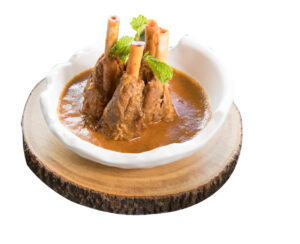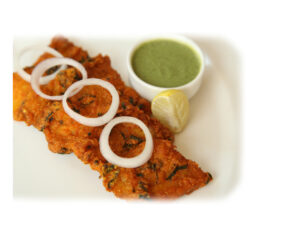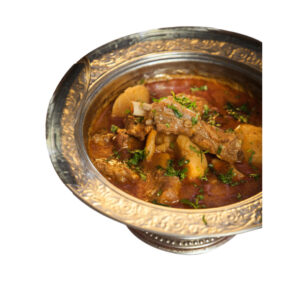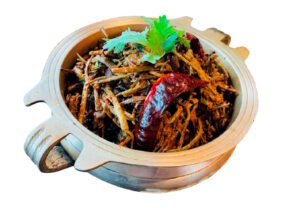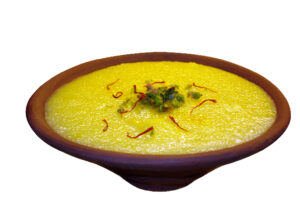Nalli Nihari
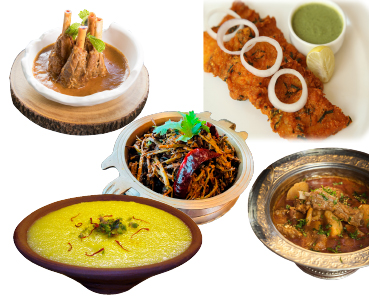
Rajesh Wadhwa
Executive chef
Taj Palace, New Delhi
This rich indulgent preparation finds its origins in Shahjahanabad, which we call Old Delhi today and was developed during the reign of the Mughals. The dish is central to the cuisines of Bhopal, Awadh and Hyderabad and our recipe is a classic version with luscious velvety texture and is best enjoyed with khameeri roti or any steaming hot naan.
Ingredients
- 1 kg goat shanks
- 5–2 lt mutton stock
- 150 ml mustard oil
- 3 gm cloves
- 3 gm green cardamom
- 2 nos bay leaf
- 5 gm cinnamon
- 150 gm sliced onion
- 40 gm ginger paste
- 40 gm garlic paste
- 10 gm red chilli powder
- 20 gm yellow chilli powder
- 20 gm turmeric powder
- 50 gm coriander powder
- 150 gm yoghurt
- 50 gm roasted gram flour
- 20 gm garam masala powder
- salt to taste
- saffron few strands
- fresh coriander leaves and ginger juliennes to garnish
Method
- In a heavy-bottomed pan, heat mustard oil. Add the whole spices and allow them to crackle. Add the sliced onions and cook until golden brown. Add the ginger and garlic pastes. Sauté well. Add goat shanks along with red chilli powder, yellow chilli powder, turmeric, coriander powder, beaten yogurt and sauté well.
- Now add mutton stock and simmer on slow heat till the shanks are tender. In a separate pan, heat ghee, add roasted gram flour and sauté till aromatic and light golden in colour. Add this mixture to the prepared shanks and adjust the consistency of the gravy till nice and creamy. Adjust seasoning. Finish with garam masala and saffron. Garnish with fresh coriander leaves and ginger juliennes. Serve hot.
Macchi Koliwada
Swapnadeep Mukherjee
Executive chef, The Metropolitan Hotel & Spa
Macchi Koliwada is one of the most iconic dishes of Mumbai. The dish was originated by Punjabi migrants from the town Hazara (Pakistan) who settled with the Koli community of Maharashtra. Hence you find this very similar to North Indian famous dish ‘Macchi Amritsari’. This recipe is quick, easy to make, flavourful with lots of scope for experimentation.
Ingredients
- 150 gm basa fillet
- 50 gm besan
- 30 gm rice flour
- 5 gm chilli paste
- 2 gm ajwain seeds
- 10 gm curd
- 5 gm degimirch
- 5 gm cumin powder
- 5 gm garam masala
- 5 gm turmeric powder
- 2 gm fennel seeds
- 1 pc lemon
- 10 gm ginger garlic paste
- 2 gm salt
- 500 ml oil to fry
Method
- Cut the basa fillet into eight equal sized dices. Marinate the fish with all the spices and curd except besan. Keep aside for 30 minutes. Take another bowl and put besan into it. Pour water to make a batter. Pour oil into a pan for deep fry. Put the marinated fish into the batter and mix well. Deep fry the fish dices until golden brown. Serve with mint chutney and slice of lemon.
Aloo Gosht
Osama Jalali
Chef, The Mughal Plate By Jalalis
Ingredients
- 1 kg mutton
- 500 gm potato
- 200 gm oil/ghee
- 5 gm turmeric
- 10 gm red chili powder
- 15 gm coriander powder
- 200 gm brown fried onion
- 200 gm yoghurt
- 8 nos cloves
- 5 gm garam masala
- 10 gm garlic paste
- 1 ltr water
- salt to taste
Method
- Heat ghee/oil in a lagan, now add cloves and meat. Sautee it for 2 minutes, then add ginger garlic paste. Leave it for 2 to 3 minutes. Now add turmeric and red chilli powder, coriander powder and salt according to taste. Sautee it for 5 to 10 minutes and add water and cover it. Leave it for half an hour so that the meat gets tender. Now add potatoes, brown onions and yoghurt. Add some more water and leave for 15 minutes till the potatoes are cooked. Add the gram masala on top and it is ready to be served. Garnish with fresh coriander.
Ker Sangri
Raj Kumar
Executive chef, Holiday Inn Jaipur City Centre
A delightful indigenous dish of Rajasthan, Ker Sangri is a traditional, spicy sabzi made with ker berry and sangri beans, cooked with common ingredients like red chilies, carom seeds, and a couple of spice powders. The addition of raisins brings out the best in the recipe, as it enhances the flavour of all the spicy ingredients while also providing sweet respites in every spoonful.
Ingredients
- 75 gm sangri
- 50 gm ker
- 70 ml mustard oil
- 5 gm cumin seeds
- 2 gm mustard seeds
- 2 gm red chilli powder
- 3 gm turmeric powder
- 10 gm coriander powder
- salt to taste
- 50 gm curd
- 10 gm dry mango powder
- 10 ml lemon juice
- 25 gm green coriander leaves
Method
- Soak ker and sangri overnight with a little salt and turmeric powder.
- Boil soaked ker-sangri and drain the water and keep aside.
- Make a smooth batter with beaten curd, turmeric, coriander, red chilli and salt in a bowl.
- Heat oil in a pan, add cumin seeds and mustard seeds, when they begin to crackle add whole dry red chilli then and the curd mixture and cook for 15 mins.
- Add ker and sangri to the above mixture and cook for another 10 mins. Add lemon juice and dry mango powder.
- Garnish with chopped coriander and serve hot.
Kashmiri Phirni
Karan Bansal
Senior sous chef
Chor Bizarre, Bikaner House
Ingredients (serves 10 small bowls)
- 80 gm thick grained suji
- 1 ltr full cream milk
- 80 gm sugar
- 25 gm saffron
- 80 gm cashews
- 100 gm condensed milk
- 20 gm chopped almonds
- 5 gm cardamom powder
Method
- Clean and soak suji and cashews separately in water.
- Soak saffron in some warm milk. Heat milk for a while continuously stirring it to avoid burning at the base. Add soaked suji and cashews after the milk starts to boil. Keep stirring. Add the soaked saffron and sprinkle cardamom powder.
- Add sugar to the milk when it comes to boil and stir it. Add condensed milk, mix well and reduce it to pouring consistency. Remove from heat. Transfer it into small earthenware bowls and let it cool. Garnish with saffron and chopped almonds. Serve it cold.
The writer is a lifestyle journalist and author.






